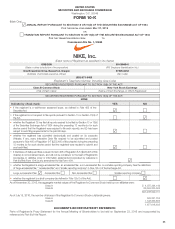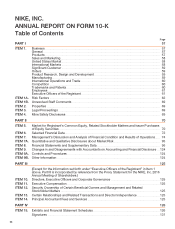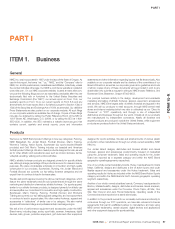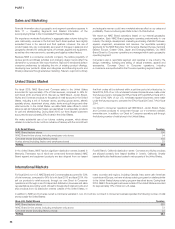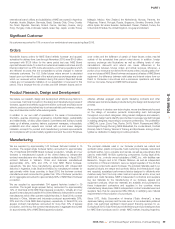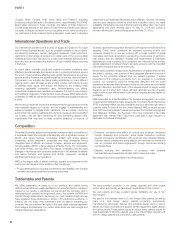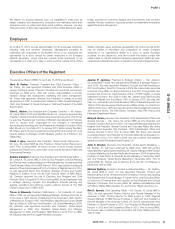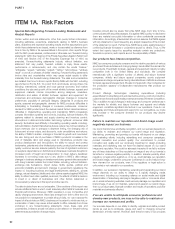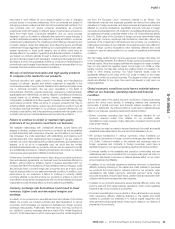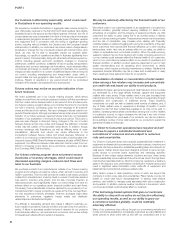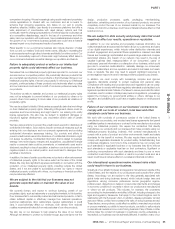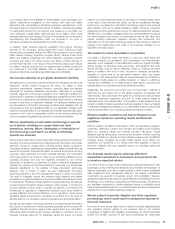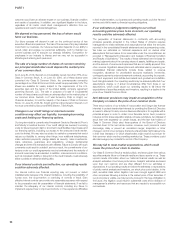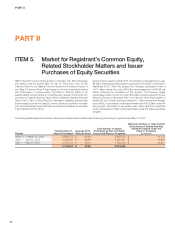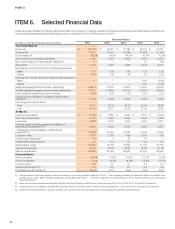Nike 2016 Annual Report Download - page 12
Download and view the complete annual report
Please find page 12 of the 2016 Nike annual report below. You can navigate through the pages in the report by either clicking on the pages listed below, or by using the keyword search tool below to find specific information within the annual report.
PART I
comparison shopping. We are increasingly using social media and proprietary
mobile applications to interact with our customers and as a means to
enhance their shopping experience. Any failure on our part to provide
attractive, effective, reliable, user-friendly e-commerce platforms that offer a
wide assortment of merchandise with rapid delivery options and that
continually meet the changing expectations of online shoppers could place us
at a competitive disadvantage, result in the loss of e-commerce and other
sales, harm our reputation with customers, have a material adverse impact on
the growth of our e-commerce business globally and could have a material
adverse impact on our business and results of operations.
Risks specific to our e-commerce business also include diversion of sales
from our and our retailers’ brick and mortar stores, difficulty in recreating the
in-store experience through direct channels and liability for online content. Our
failure to successfully respond to these risks might adversely affect sales in
our e-commerce business, as well as damage our reputation and brands.
Failure to adequately protect or enforce our intellectual
property rights could adversely affect our business.
We believe that our intellectual property rights are important to our brand, our
success and our competitive position. We periodically discover products that
are counterfeit reproductions of our products or that otherwise infringe on our
intellectual property rights. If we are unsuccessful in enforcing our intellectual
property, continued sales of these products could adversely affect our sales
and our brand and could result in a shift of consumer preference away from
our products.
The actions we take to establish and protect our intellectual property rights
may not be adequate to prevent imitation of our products by others or to
prevent others from seeking to block sales of our products as violations of
proprietary rights.
We may be subject to liability if third parties successfully claim that we infringe
on their intellectual property rights. Defending infringement claims could be
expensive and time-consuming and might result in our entering into costly
license agreements. We also may be subject to significant damages or
injunctions against development, use, importation and/or sale of certain
products.
We take various actions to prevent the unauthorized use and/or disclosure of
confidential information. Such actions include contractual measures such as
entering into non-disclosure and non-compete agreements and providing
confidential information awareness training. Our controls and efforts to
prevent unauthorized use and/or disclosure of confidential information might
not always be effective. Confidential information that is related to business
strategy, new technologies, mergers and acquisitions, unpublished financial
results or personal data could be prematurely or inadvertently used and/or
disclosed, resulting in a loss of reputation, a decline in our stock price and/or a
negative impact on our market position, and could lead to damages, fines,
penalties or injunctions.
In addition, the laws of certain countries may not protect or allow enforcement
of intellectual property rights to the same extent as the laws of the United
States. We may face significant expenses and liability in connection with the
protection of our intellectual property rights, including outside the United
States, and if we are unable to successfully protect our rights or resolve
intellectual property conflicts with others, our business or financial condition
may be adversely affected.
We are subject to the risk that our licensees may not
generate expected sales or maintain the value of our
brands.
We currently license, and expect to continue licensing, certain of our
proprietary rights, such as trademarks or copyrighted material, to third parties.
If our licensees fail to successfully market and sell licensed products, or fail to
obtain sufficient capital or effectively manage their business operations,
customer relationships, labor relationships, supplier relationships or credit
risks, it could adversely affect our revenues, both directly from reduced
royalties received and indirectly from reduced sales of our other products.
We also rely on our licensees to help preserve the value of our brands.
Although we attempt to protect our brands through approval rights over the
design, production processes, quality, packaging, merchandising,
distribution, advertising and promotion of our licensed products, we cannot
completely control the use of our licensed brands by our licensees. The
misuse of a brand by a licensee could have a material adverse effect on that
brand and on us.
We are subject to data security and privacy risks that could
negatively affect our results, operations or reputation.
In addition to our own sensitive and proprietary business information, we
collect transactional and personal information about our customers and users
of our digital experiences, which include online distribution channels and
product engagement and personal fitness applications. Hackers and data
thieves are increasingly sophisticated and operate large-scale and complex
automated attacks. Any breach of our network may result in the loss of
valuable business data, misappropriation of our consumers’, users’ or
employees’ personal information or a disruption of our business, which could
give rise to unwanted media attention, materially damage our consumers,
customer relationships and our reputation and result in lost sales, lost users,
fines, or lawsuits. We also may need to expend significant resources to
protect against, respond to and/or redress problems caused by any breach.
In addition, we must comply with increasingly complex and rigorous
regulatory standards enacted to protect business and personal data.
Compliance with existing and proposed laws and regulations can be costly,
and any failure to comply with these regulatory standards could subject us to
legal and reputational risks. Misuse of or failure to secure personal information
could also result in violation of data privacy laws and regulations, proceedings
against the Company by governmental entities or others, damage to our
reputation and credibility and could have a negative impact on revenues and
profits.
Failure of our contractors or our licensees’ contractors to
comply with our code of conduct, local laws and other
standards could harm our business.
We work with hundreds of contractors outside of the United States to
manufacture our products, and we also have license agreements that permit
unaffiliated parties to manufacture or contract for the manufacture of products
using our intellectual property. We require the contractors that directly
manufacture our products and our licensees that make products using our
intellectual property (including, indirectly, their contract manufacturers) to
comply with a code of conduct and other environmental, health and safety
standards for the benefit of workers. We also require these contractors to
comply with applicable standards for product safety. Notwithstanding their
contractual obligations, from time to time contractors may not comply with
such standards or applicable local law or our licensees may fail to enforce
such standards or applicable local law on their contractors. Significant or
continuing noncompliance with such standards and laws by one or more
contractors could harm our reputation or result in a product recall and, as a
result, could have an adverse effect on our sales and financial condition.
Our international operations involve inherent risks which
could result in harm to our business.
Virtually all of our athletic footwear and apparel is manufactured outside of the
United States, and the majority of our products are sold outside of the United
States. Accordingly, we are subject to the risks generally associated with
global trade and doing business abroad, which include foreign laws and
regulations, varying consumer preferences across geographic regions,
political unrest, disruptions or delays in cross-border shipments and changes
in economic conditions in countries in which our products are manufactured
or where we sell products. This includes, for example, the uncertainty
surrounding the implementation and effect of Brexit, including changes to the
legal and regulatory framework that apply to the United Kingdom and its
relationship with the European Union. In addition, disease outbreaks, terrorist
acts and military conflict have increased the risks of doing business abroad.
These factors, among others, could affect our ability to manufacture products
or procure materials, our ability to import products, our ability to sell products
in international markets and our cost of doing business. If any of these or other
factors make the conduct of business in a particular country undesirable or
impractical, our business could be adversely affected. In addition, many of our
NIKE, INC. 2016 Annual Report and Notice of Annual Meeting 65
FORM 10-K


